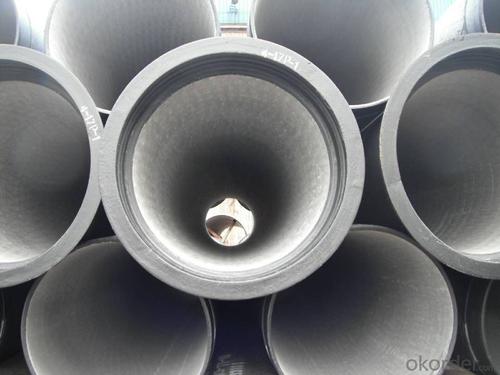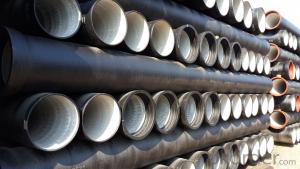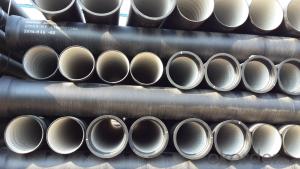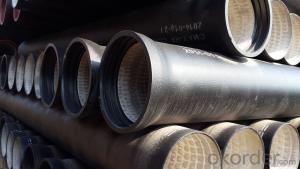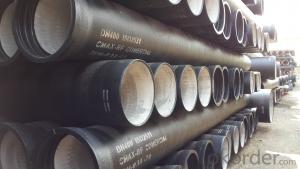DUCTILE IRON PIPE DN300
- Loading Port:
- China Main Port
- Payment Terms:
- TT OR LC
- Min Order Qty:
- -
- Supply Capability:
- -
OKorder Service Pledge
OKorder Financial Service
You Might Also Like
Specification:
1) The standard of pipe: ISO2531:1998, K9
2) Effective length: 6m
3) Inner cement line: Portland cement line as per ISO4179
4) Zinc coating: at least 130g/m2 as per ISO8179
5) Bitumen painting: at least 70um as per ISO8179
6) With 100% quantity of NBR ring, or SBR ring, or EPDM ring as per ISO4633
7) DN80mm-800mm
8) High strength, lighter than grey iron, good corrosion resistance, no furring, small flow resistance, easy fixing, long life tome about 100 yeas
9) Produced by Hangzhou chunfeng machine
10) Checked by automatic inspection equipment
11) Composition:
Chemical composition | |||
Chemical composition | Ductile Cast Iron Pipe (%) | Grey iron pipe (%) | Steel pipe (%) |
C | 3.5-4.0 | 3.2-3.8 | 0.1-0.2 |
Si | 1.9-2.6 | 1.4-2.2 | 0.15-0.4 |
Mn | 0.15-0.45 | 0.4-0.6 | 0.3-0.6 |
P | ≤0.06 | ≤0.3 | 0.02-0.03 |
S | ≤0.02 | ≤0.1 | 0.02-0.03 |
Mg | 0.03-0.06 |
|
|
12) Feature:
Mechanical properties | |||
| Ductile Cast Iron Pipe | Grey Iron Pipe | Steel Pipe |
Tensile Strength(Mpa) | ≥420 | 150-260 | ≥400 |
Yield Strength(Mpa) | ≥300 | No Confirmation | No Confirmation |
Bending Strength(Mpa) | ≥590 | 200-360 | ≥400 |
Elongation (%) | ≥10 | Neglected | ≥18 |
Brinell Hardness(HBS) | ≤230 | ≤230 | About 140 |
13) T type mechanical joint
14) Packing: in bulk or container
- Q: What is the expected noise reduction of ductile iron pipes?
- The expected noise reduction of ductile iron pipes can vary depending on various factors, such as the thickness of the pipes, the specific installation method, and the surrounding environment. However, ductile iron pipes are generally known for their ability to significantly reduce noise levels compared to other materials, thanks to their dense and robust structure that effectively dampens sound vibrations.
- Q: What is the expected deflection range for ductile iron pipes?
- The expected deflection range for ductile iron pipes can vary depending on several factors such as pipe diameter, wall thickness, soil conditions, and installation methods. Generally, ductile iron pipes have a higher deflection capacity compared to other materials like PVC or concrete pipes. For smaller diameter ductile iron pipes (up to 12 inches), the expected deflection range is typically around 2-3% of the pipe diameter. This means that a 12-inch ductile iron pipe could deflect up to approximately 0.24-0.36 inches. For larger diameter ductile iron pipes (greater than 12 inches), the expected deflection range can be slightly higher, ranging from 2-5% of the pipe diameter. This means that a 24-inch ductile iron pipe could deflect up to approximately 0.48-1.2 inches. It is important to note that these values are general estimates and should be verified with the manufacturer's specifications or engineering design guidelines for a specific project. Additionally, proper installation techniques and backfilling practices should be followed to ensure the pipe's structural integrity and prevent excessive deflection.
- Q: Does the cast iron pipe need separate corrosion protection?
- The pipe has been antirust in the production process and can be used directly
- Q: The difference between spheroidal graphite cast iron pipe and HDPE water supply pipe
- HDPE pipe is made of hot melt butt joint, and the strength of interface is very good. Ductile iron pipes are made of socket joint, and reinforced concrete piers shall be rammed on three links, elbows and other parts. In this regard, the cost of natural selection of ductile iron pipe, HDPE pipe than the choice of high.
- Q: Can ductile iron pipes be used for underground mining applications?
- Yes, ductile iron pipes can be used for underground mining applications. Ductile iron is a strong and durable material that can withstand the harsh conditions and heavy loads associated with mining operations. It has excellent resistance to corrosion and is able to handle high pressure and temperature environments. Additionally, ductile iron pipes are flexible and can be easily installed and maintained, making them suitable for underground mining applications where mobility and adaptability are important. Overall, ductile iron pipes are a reliable and cost-effective choice for underground mining operations.
- Q: Are ductile iron pipes suitable for underground installations?
- Yes, ductile iron pipes are suitable for underground installations. Ductile iron is a highly durable and strong material that can withstand the various pressures and stresses associated with underground environments. It has excellent resistance to corrosion, making it an ideal choice for underground applications where it may be exposed to moisture, soil, and other corrosive elements. Ductile iron pipes also have a high tensile strength, which allows them to withstand external loads and prevent cracking or breakage under ground movement or heavy traffic. Additionally, ductile iron pipes have a longer lifespan compared to other materials, making them a cost-effective option for underground installations. Overall, ductile iron pipes are a reliable and suitable choice for underground applications due to their durability, corrosion resistance, and long-term performance.
- Q: What are the differences between cast iron pipes W and A?
- Cast iron drainage pipe generally divided into three categories, namely W type socket cast iron pipes, cast iron pipes of A type, B type cast iron drainage pipe, the three pipes have good seismic performance, strong sealing performance, simple construction, convenient maintenance, reliable use, so it is also called the cast iron pipe for earthquake.
- Q: Are ductile iron pipes suitable for use in food processing plants?
- Yes, ductile iron pipes are suitable for use in food processing plants. Ductile iron pipes have a number of characteristics that make them highly suitable for this application. Firstly, ductile iron pipes are strong and durable, capable of withstanding high-pressure applications. This is important in food processing plants where the pipes are subjected to various pressures during the transportation of liquids and slurries. Additionally, ductile iron pipes have excellent corrosion resistance. This is crucial in food processing plants where the pipes come into contact with different types of food, beverages, and cleaning agents, which can be corrosive over time. The corrosion resistance of ductile iron pipes ensures the integrity of the pipes and prevents contamination of the food products. Furthermore, ductile iron pipes are highly resistant to temperature fluctuations, making them suitable for the extreme temperature conditions often found in food processing plants. They can withstand both hot and cold fluids without any adverse effects on their structural integrity. Moreover, ductile iron pipes have a smooth inner surface, which helps to maintain the quality and purity of food products. The smooth interior minimizes the formation of deposits, such as scaling or biofilm, and reduces the risk of bacterial growth. This is essential in food processing plants where maintaining a hygienic environment is of utmost importance. Lastly, ductile iron pipes are easy to install and maintain. They have a long service life and require minimal maintenance, reducing downtime and associated costs in food processing plants. Considering these factors, ductile iron pipes are a reliable and suitable choice for use in food processing plants, ensuring the safe and efficient transportation of fluids while meeting the stringent hygiene and quality requirements of the industry.
- Q: Are ductile iron pipes suitable for horizontal directional drilling?
- Yes, ductile iron pipes are suitable for horizontal directional drilling due to their high strength and flexibility, which allows them to withstand the stress and bending forces during the drilling process.
- Q: Can ductile iron pipes be used for underground fire protection systems?
- Ductile iron pipes are indeed applicable for underground fire protection systems. Their exceptional strength and durability render them suitable for enduring the intense pressure and high temperatures that may arise during a fire. Moreover, these pipes exhibit significant resistance to corrosion, a vital attribute for long-term underground usage. In addition, they possess exceptional flow characteristics, enabling swift and efficient water delivery for extinguishing fires. All in all, ductile iron pipes prove to be a dependable and efficient selection for underground fire protection systems.
Send your message to us
DUCTILE IRON PIPE DN300
- Loading Port:
- China Main Port
- Payment Terms:
- TT OR LC
- Min Order Qty:
- -
- Supply Capability:
- -
OKorder Service Pledge
OKorder Financial Service
Similar products
Hot products
Hot Searches
Related keywords




